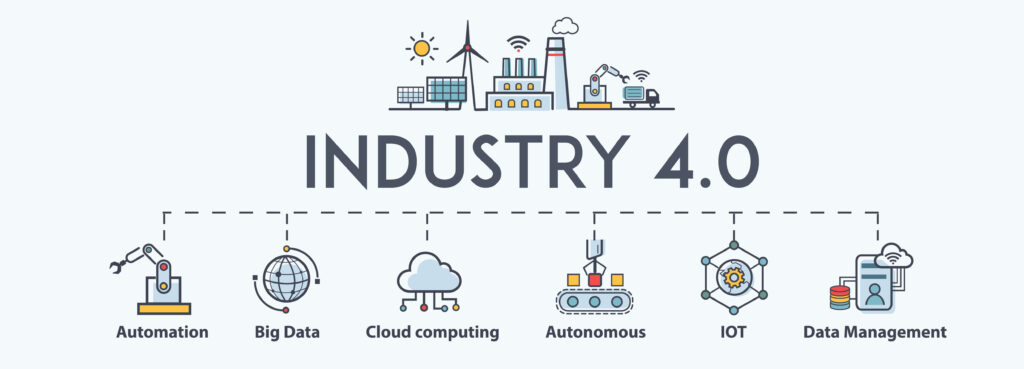What is Industry 4.0?
The fourth industrial revolution
Put simply, Industry 4.0 relates to the increasing use of computers and data within an industrial setting.
We are no strangers of the use of computers in our daily lives; from smartphones to self-scan supermarket checkouts, computers are used seemingly everywhere to make our lives easier.
The same is true for manufacturing – computers aid in:
- the design of parts,
- the machining of parts, and
- to track the entire production process .
Computers introduced the beginning of the third industrial revolution – using computers to help in manufacturing and reducing the need for purely manual production.
Industry 4.0 is merely the next step on that same path, increasing the level of automation in manufacturing by taking advantage of large amounts of data (big data).

As computers have slowly crept into each aspect of the manufacturing field over the last few decades, the amount of data created has also increased. This includes a variety of information sources related to all aspects of the manufacturing process. Almost every aspect of a manufacturing operation from start to finish has been touched by a computer and each step generates data.
By using all of this data, the aim is to give computers all of the information that humans currently have about how to run a manufacturing production line and teach the computers to do it themselves.
Computers are already involved in each individual step in the production process; all that remains is to link each of these steps together. This leads us to the primary goal for Industry 4.0 – to create systems of computers and machines that can communicate with each other to achieve a larger goal and operate a production line without much need for human involvement.
This interconnectivity of a manufacturing environment also allows for greater flexibility. With all information available at all points in the process, adjustments and small-batch products can be produced much more economically.
Greater connectivity in manufacturing
With Industry 4.0 fully implemented, manufacturing will become far more flexible and streamlined than it has ever been before. Upgrades and improvements to products can be achievement much more rapidly and with reduced cost, leading to more affordable and frequent upgrades for end users. Not only that, but the technologies and systems developed as part of Industry 4.0 will impact our lives far wider than just the field of manufacturing. Interconnectivity of systems and automation will become even more prevalent. A future can be possible in which currently isolated systems will communicate with each other.
For example, if your refrigerator is running low on food it could contact your grocery shopping account and add items to your next delivery, or send directions to the nearest supermarket to your car’s navigation system. These ideas are already on the cusp of possibility as the technology is already available; only the connections between devices are required.
This idea of interconnected devices is given the term ‘Internet of Things’, or IoT, and has considerable overlap with Industry 4.0 technologies. Combining these IoT ideas with a fully realised Industry 4.0 manufacturing sector, the future may even hold the ability for bespoke products to be automatically ordered and delivered to a user without their interaction. For example, if a fault is detected inside your car, or an improved component is designed, the car could request the new/replacement part to be manufactured and delivered for installation, and even arrange the installation with a local mechanic, all without human intervention.
Challenges
When you dig into the details of a technological advancement as large as Industry 4.0, a lot of challenges are revealed that need to be overcome. Communication across the entire production line is required. Every part must be physically tracked throughout its manufacture. In the event of an error or unwanted variation, errors must be identified and decisions made to fix them. These are just a few examples of problems that are easy for a human to solve, but much harder for a computer.
As part of the Dat4.Zero project, we are looking into ways of streamlining information sharing and data collation across multiple areas of a manufacturing production line, from smart sensors to contextual batch information.
The heart of the Dat4.zero project is a data management core which will organise all of these different data sources into one location, enabling easy access for analysis. By making all of the different sources of manufacturing-related information available in one easy to access location, we are aiming to make smart decisions about the process and make manufacturing more efficient with fewer errors.